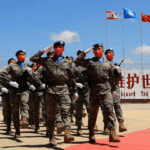U.S. plans to restrict exports of AI-related technologies have drawn warnings from experts who say the move could stifle global innovation. The proposed framework, aimed at limiting access for certain countries to advanced tech tools, has sparked debates about balancing national security with international collaboration.
🚨 Gai Keke, a researcher at the Beijing Institute of Technology, argues these restrictions could 'create artificial barriers in an increasingly interconnected field.' The remarks come as global tech firms worry about fragmented AI development ecosystems.
💡 Why does this matter? AI breakthroughs often rely on multinational teams – think of it like a digital Avengers initiative. Export controls could delay advancements in healthcare, climate modeling, and smart city development that benefit billions.
🌏 Emerging markets in Asia and Africa might feel the pinch most acutely. Many countries depend on international partnerships to build their tech capacities. The U.S. controls could reshape global supply chains, potentially pushing nations to develop alternative systems.
📈 For young entrepreneurs: Watch how this affects startup funding and cross-border data flows. Some investors are already rethinking strategies for AI ventures with international components.
What’s next? The proposal enters a 60-day review period, with tech giants and foreign governments expected to push back. As one analyst quipped: 'Innovation doesn’t carry a passport – but maybe microchips do now.'
Reference(s):
Expert: U.S. export curbs on AI would hinder international cooperation
cgtn.com




